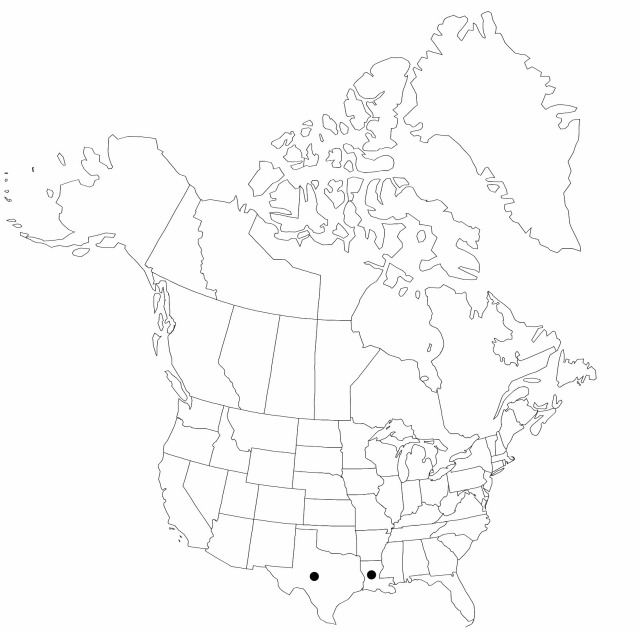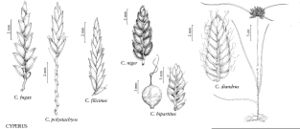Cyperus fugax
Kongel. Danske Vidensk. Selsk. Skr., Naturvidensk. Math. Afd., ser. 5, 2: 196. 1850.
Herbs, annual, cespitose. Culms (1–)10–30(–60) together, roundly trigonous proximally, trigonous distally, (0.5–)3–6(–12) cm × (0.2–)0.4–0.8 mm, glabrous. Leaves V-shaped, (1–)3–5(–10) cm × (0.5–)1–2 mm. Inflorescences: spikes loosely ovoid, 8–15(–25) mm wide; rachis 1–3 mm; rays (1–)2–4(–6), (0.5–)1–3(–6) cm; 2d order rays absent; bracts (1–)2–4(–5), ascending at 30–45°, V-shaped, (1–)2.5–6(–11) cm × 0.5–1.8 mm. Spikelets (2–)4–6(–10), linear-lanceoloid, strongly flattened, (5–)8–12(–18) × 1.2–1.5 (1.8) mm; floral scales (5–)10–16(–32), laterally clear, stramineous or light reddish brown, medially green, laterally ribless, medially 3(–5)-ribbed, ovate, (1.2–)1.3–1.6(–2) × 1–1.2(–1.4) mm, apex obtuse, mucronate to minutely mucronulate. Flowers: stamens 2; anthers 0.1–0.2 mm; styles 0.1–0.3(–0.4) mm; stigmas 0.3–0.4 mm. Achenes light to dark brown, glossy or iridescent, stipitate, oblong-obovoid, 0.9–1.1 × 0.4–0.5 mm, stipe 0.1 mm, apex truncate, apiculate, surfaces punctate.
Phenology: Fruiting early summer.
Habitat: Wet, disturbed sandy soils in full sun
Elevation: 0–200 m
Distribution

La., Tex., West Indies (Cuba), Central America, South America (Ecuador).
Discussion
Cyperus fugax is known from Louisiana from an early nineteeth century collection from “western Louisiana” (Hale s.n., TCD).
Cyperus fugax has been treated as a form of C. polystachyos (G. Kükenthal 1935–1936; A. B. Ayers 1946); nevertheless, specific status is appropriate. The most conspicuous differences are the annual habit and small size (less than 12 cm) of C. fugax; C. polystachyos is a perennial of moderate size (mostly taller than 20 cm). Other differences are summarized below.
Cyperus polystachyos is characterized as a shortly rhizomatous perennial; floral scales oblong, 1.8–2.4 mm, closely imbricate; styles 0.6–1 mm; stigmas 1.4–2 mm; anthers 0.6–0.8 mm; achenes substipitate to cuneate, slightly compressed laterally.
Cyperus fugax is characterized as a nonrhizomatous annual; floral scales ovate, 1.3–1.6 mm, loosely imbricate; styles 0.1–0.2 mm; stigmas 0.3–0.4 mm; filaments 1.2–1.4 mm; anthers 0.1–0.2 mm; achenes stipitate, strongly compressed laterally.
Selected References
None.
